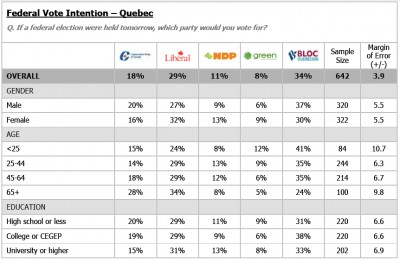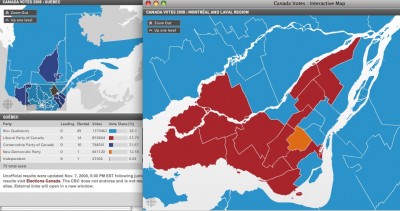In California, identity politics is a way of life. Ask Pete Wilson, ex-Governor of California on how Latino politics can derail a career, as detailed in a LA Times magazine article from 2004. The same article highlights Republican concerns with shifting demographics::
“Many Republicans view the mushrooming Latino voter rolls in the same way a person looks at a growing mole: One hopes it’s benign but fears for the worst.”
Unlike in California where immigration is resulting in dramatic demographic shifts, here in Canada, a hot-button issue is Québec separatism that stems from centuries-old disputes. The province of Québec has a distinct francophone culture when compared to the rest of predominantly anglophone Canada and this cultural divide naturally affects politics at both the provincial and federal levels.
Currently, at the federal level, Canada {with a variation of the Westminster parliamentary system} has a minority government {plurality of parliamentary seats} with Conservative Stephen Harper as Prime Minister. Minority governments tend to be unstable. Indicative of this, the Conservatives had a scare last December when Stephen Harper angered the other parties, bringing the country to the brink of Constitutional crisis. Recent polls in Canada showed that about half of the voters wanted a more stable majority government, where one party has a majority of the seats. Moreover, recent polls indicated that support for the Conservatives is dwindling, likely leading to a situation where the Conservatives and Liberals have close to the same number of seats, further deadlocking Parliament. An article a week and a half ago by the Montréal Gazette brought up a controversial argument::
“Quebecers more than others have it in their power to break this log-jam, by taking a more active hand in national governance instead of ‘parking’ their votes with an increasingly irrelevant Bloc Québécois. Had Quebecers voted for national parties in the same proportion as other Canadians in the last election, we would have a majority government. The instability of minority times makes the government of Canada weaker, which serves the sovereignists’ interests but not the public interest.”

The 2008 federal results in Québec saw BQ making a strong showing with 49 ridings {seats} of 75 in Québec and 308 in Canada. The map below shows Bloc in light blue, Conservatives (PC) in dark blue, Liberals (LP) in Red, and New Democrats (NDP) in orange. The Bloc is strong throughout the province, while the Conservatives have support in a few rural areas, and the Liberals and NDP have appeal in or near the cities of Montréal and Ottawa.

“It’s the same good old Liberal Party of Canada that wants to put Québec in its place.”–Pierre Paquette, Bloc MP Joliette
“It shows that he’s not only been out of Canada for 35 years, he’s never known anything about Québec except what he learned at Upper Canada College and, frankly, I’m not afraid of him a bit.”–Thomas Mulcair, NDP MP Outremont
“The best possible Canada is a Canada where Québecers are in power…The Bloc Québécois is not a solution for a better Québec and Canada.”–Michael Ignatieff, 3 June 2009 at a Montréal fundraiser
While Ignatieff may have had his reasons, the Bloc represents a set of meanings to many Québecers and I fail to see the upside of antagonizing the Bloc. The tories went after the Bloc earlier in the summer, accusing the party on being soft on pedophiles because they didn’t support tougher legislation on minimum sentencing for child trafficking. The ads haven’t affected polls and the Conservatices are still falling behind. Having appeal in Québec requires subtlety. As stated above, Harper hasn’t done much to appeal to Quebecers, but Conservative writer Bob Plamondon in a Macleans article gets at the heart of the matter. Harper needs to understand culture in order to build social capital::
“I don’t think it was so much that those specific policies were abhorred by Quebecers…because in the scheme of government activities, they are relatively minor issues. But they spoke to larger issues—does Stephen Harper understand Quebec and can he be trusted? I think Quebecers drew the conclusion that he’s disconnected from them. They couldn’t identify among Harper’s team a particularly strong lieutenant who had near-veto power over what went on in Ottawa with respect to those matters that are of particular concern to Quebecers.”
- How will globalization shape California identity politics?
- Will culture serve as a political rallying point?
- Strengthening of identity politics caucus/coalition powerbase{s}
- Use of cultural distinction socially & politically
- Strategies of mainstream politicians/parties to negotiate with or combat a caucus/coalition
- Use of Web 2.0 & SMS technologies & social media to politically engage electorate in a culturally-relevant fashion
Song:: Tricot Machine -L’Ours {Montréal, QC}


Comments 2
ThickCulture » Identity Politics & Learning from Bloc Québécois » words — July 29, 2009
[...] Read this article: ThickCulture » Identity Politics & Learning from Bloc Québécois [...]
What’s the Deal With The Bloc Québécois? « Another War of Jenkins' Ear — March 27, 2011
[...] are defenses of the Bloc’s existence, but they tend to be that the Bloc is still relatively popular [...]